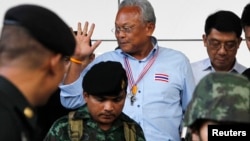The last time most Thais saw politician Suthep Thaugsuban was in 2015 when he entered the Buddhist monkhood and announced his retirement after spearheading protests that culminated in a military coup against a government he detested.
The military, after taking power, clamped a tight lid on politics, and the rivalry between the military-royalist establishment and new upstart political forces that had roiled the country for a decade was stifled.
But now a long-promised general election is on the horizon - due sometime between February and May - and old animosities are stirring and veteran political brawler Suthep, 68, is back.
Suthep, a one-time deputy prime minister in a pro-establishment government, has said he will contest the election under the banner of a new party he set up to sustain the work of the military government and to campaign for its leader, Prayuth Chan-ocha, to be prime minister of a civilian administration.
The return of Suthep, who has a record of mobilizing crowds on the streets in support of the establishment, could be a big asset for the military which has made no secret of its aim to retain a grip over politics after the election.
The military and Suthep have common cause in their burning desire to rid the country of the influence of former premier Thaksin Shinawatra and his family, whose supporters have been biding their time and pinning their hopes on the election.
Suthep makes no secret of his support for former army chief Prayuth and his wish to see him return as prime minister after the vote, but says he must defer to his new party, the Action Coalition for Thailand, which has yet to spell out its position.
"He's a good guy, not corrupt, determined, and he has the trust of his people and is loyal to the monarchy," Suthep told Reuters in a recent interview.
"So I cheer him on, the more he can succeed, the better for the country," Suthep said, while adding he had no desire to take on any leadership role in a new government.
Suthep, for years known as a pugnacious deal-maker, has been a central figure in well over a decade of turmoil that began in 2000, when former telecommunications tycoon Thaksin became prime minister for the first time
Thaksin fired up support in the provinces with pro-poor policies, and shook up politics with his brash, election-winning ways.
In the process, he made enemies in the Bangkok-based, military-dominated establishment, which accused him of corruption and buying election victories.
Suthep, a former shrimp and palm-oil magnate from Thailand's south, served as deputy prime minister in a pro-establishment government after Thaksin was ousted in a 2006 coup, and which oversaw a bloody crackdown on Thaksin's "red-shirt" supporters occupying Bangkok streets in 2010.
Suthep expects his party's support to come from Thaksin's main enemies, the Bangkok middle class, and he's keen to see that the party sets an example with transparent funding and the inclusion of women, to bolster that support.
'Leaders gone'
Suthep lead protests against a government formed in 2011 by Thaksin's sister, Yingluck Shinawatra, rallying pro-establishment crowds who tried to march on the government's offices to shut it down.
The turmoil eventually triggered the coup by then army chief Prayuth. Suthep and his allies celebrated the fall of another government loyal to their enemy, Thaksin.
Suthep said he expected Thaksin's party to see its support whittled down in its northern and northeastern heartlands in the next election, though the Shinawatras still commanded a significant block of votes.
But the people were slowly seeing the truth about them, he said.
"All their leaders are gone," Suthep said of the voters who have loyally stuck with Thaksin's parties.
"People can see that the brother and sister have fled, deserting those that served them, who are in jail, from cabinet ministers to ordinary folk," he said.
Thaksin has been living in exile since 2008 to avoid a graft conviction he said was politically motivated. Yingluck fled from the country last August during a criminal negligence trial that eventually sentenced her to five years in jail.
She also denied wrongdoing.
Suthep praised the military government for overseeing the introduction of a constitution that critics say enshrines the military's sway over civilian governments.
But he said the military government had not completed its work and he wanted his party to ensure the country would stay on the course the military had set, with no sliding back to what he described as the dangerous old ways.
A political rival said Suthep was making a fatal mistake by nailing his colors to the military's mast.
"This will be Suthep's last role," said Nattawut Saikua, a deputy prime minister in Yingluck's cabinet, who, like Suthep, is known as a fiery orator, though for the opposite side in Thailand's drawn-out political battle.
"Politicians who walk away from the democratic system and stand with a dictator have never been able to come back or be accepted by the people."





